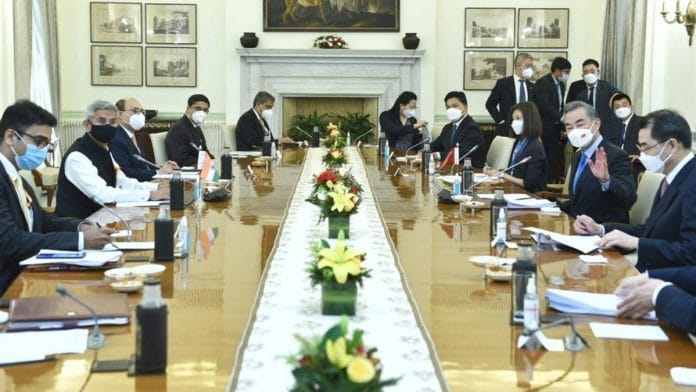New Delhi: External Affairs Minister S. Jaishankar and Chinese State Councillor and Foreign Minister Wang Yi are likely to meet once again later this month in Tashkent to discuss the disengagement process and bringing an end to the military standoff at the Line of Actual Control (LAC) on 27-28 July.
The ministers are expected to meet on the sidelines of the meeting of foreign ministers of the Shanghai Cooperation Organisation (SCO) conference that is scheduled to take place in the capital of Uzbekistan, sources told ThePrint.
The meeting will take place days after the 16th round of commander-level talks between India and China even as both sides are working towards a total disengagement of the forces from all friction areas.
Both the ministers last met in Bali, Indonesia on the sidelines of the G20 Foreign Ministers’ Meeting where India was firm on its demand of complete disengagement from areas like Depsang Plains and Demchok.
The LAC standoff which began in 2020 and which saw forces on both sides violenty clashing with each other killing 20 Indian soldiers in June 2020, is yet to be completely resolved. In 2021, India and China disengaged from north and south banks of the Pangong Tso and Gogra Heights.
But China believes since Wang Yi’s visit to India in March, Beijing and New Delhi have “effectively managed and controlled differences”, according to a Chinese foreign ministry statement.
According to sources, the foreign ministers’ meeting is likely to pave the way for a meeting between Chinese President Xi Jinping and Prime Minister Narendra Modi, who will be coming face to face for the first since the standoff began. The two leaders, however, have met virtually several times on a number of multilateral forums.
Modi and Xi are expected to meet at the 2022 annual summit of the SCO Heads of State Council, which will betaking place on 15-16 September in Samarkand, Uzbekistan. Uzbekistan took over the chairmanship of the SCO from Tajikistan in September 2021.
Of late, talks between India and China have gained momentum even as the process of de-escalation and disengagement slowed down.
Despite the increasing closeness between Russia and China, which has accelerated since Moscow’s invasion of Ukraine, India has refused to come under western pressure in calling out Russian President Vladimir Putin’s actions.
Beijing has, particularly, lauded Jaishankar’s recent speech in Europe where he said that the Ukraine war will not have any impact on the bilateral ties between India and China.
“The Chinese don’t need a precedent somewhere in the world on how to engage with us or not engage with us, how to be difficult with us or not be difficult with us. I just don’t see that as a very clever argument…. This is the construct you are trying to impose on me and I don’t accept it,” Jaishankar had said in June.
Thereafter, China has also engaged with India’s new Ambassador to Beijing Pradeep Kumar Rawat, wherein Wang Yi put forward a “four-pronged perseverance” on China-India relations.
The SCO is a permanent intergovernmental international organisation, the creation of which was announced on 15 June 2001 in Shanghai. India will be the SCO chair, assuming its presidency for a one-year period from September 2022. Varanasi will be the first city in SCO region to be granted the rotating title of ‘Cultural & Tourism capital of SCO.’
(Edited by Tony Rai)
Also Read: India-China row ‘not set in stone’, economic asymmetry among Galwan triggers, says Shyam Saran






